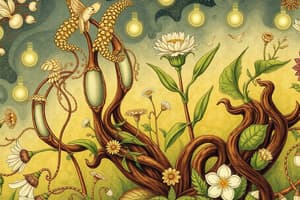Podcast
Questions and Answers
What is a biogeochemical cycle?
What is a biogeochemical cycle?
- A process that converts light energy into chemical energy
- A process by which bacteria convert nitrates into nitrogen gas
- A process that recycles elements and other matter through the biosphere (correct)
- A process by which water enters the atmosphere by evaporating from the leaves of plants
A _____________________ is a chemical substance that organisms require to live.
A _____________________ is a chemical substance that organisms require to live.
Nutrient
The ______________________ cycle is not a nutrient cycle.
The ______________________ cycle is not a nutrient cycle.
Water
Identify the nutrients described below.
Identify the nutrients described below.
A ______________________ serves as a long-term storage area for water or nutrients.
A ______________________ serves as a long-term storage area for water or nutrients.
Which of the following is a reservoir for carbon and nitrogen, but not phosphorus?
Which of the following is a reservoir for carbon and nitrogen, but not phosphorus?
Identify the following terms associated with the water cycle.
Identify the following terms associated with the water cycle.
Which cycle is being described: Bacteria in the soil converts this nutrient into a usable form. Plants take up the usable nutrient through the soil and assimilate it into proteins, making it part of the plant.
Which cycle is being described: Bacteria in the soil converts this nutrient into a usable form. Plants take up the usable nutrient through the soil and assimilate it into proteins, making it part of the plant.
Identify the following terms that are associated with the nitrogen cycle.
Identify the following terms that are associated with the nitrogen cycle.
Identify which molecule or element is described below.
Identify which molecule or element is described below.
Identify a risk for accessing carbon from fossil fuels.
Identify a risk for accessing carbon from fossil fuels.
Study Notes
Biogeochemical Cycles
- A biogeochemical cycle recycles elements and other matter through the biosphere.
- Essential processes include nutrient cycles such as nitrogen, carbon, and phosphorus.
Nutrients
- Nutrients are chemical substances required by organisms for survival.
Water Cycle
- The water cycle is distinct from nutrient cycles and involves processes like evaporation, condensation, and precipitation.
Key Nutrients
- Phosphorus: Key for organic compounds, nucleic acids, and ATP formation.
- Nitrogen: Most abundant gas in the atmosphere; absorbed by plants through soil bacteria.
- Carbon: Utilized by plants during photosynthesis, present in all living organisms.
Reservoirs
- Reservoirs serve as long-term storage areas for water or nutrients.
- The atmosphere acts as a reservoir for carbon and nitrogen but not for phosphorus.
Water Cycle Processes
- Condensation: Water vapor changes from gas to liquid.
- Precipitation: Water falls back to Earth in solid or liquid form.
- Evaporation: Liquid water changes into vapor.
- Transpiration: Water evaporates from plant leaves.
Nitrogen Cycle
- The nitrogen cycle involves the transformation of nitrogen through various processes:
- Nitrification: Bacteria convert ammonia to nitrates.
- Denitrification: Bacteria convert nitrates to nitrogen gas.
- Nitrogen fixation: Bacteria convert nitrogen gas into ammonia.
Limiting Nutrients
- Water and carbon are not considered limiting nutrients.
- Nitrogen and phosphorus are identified as limiting nutrients crucial for ecosystem productivity.
Key Elements and Molecules
- Carbon is fundamental to all organic compounds.
- Phosphorus is vital for bones and cell membranes.
- Nitrogen is a key component of proteins.
- Water is termed the universal solvent due to its ability to dissolve many substances.
Carbon and Fossil Fuels
- Carbon stored in fossil fuels is isolated from the natural carbon cycle, posing environmental risks when accessed.
- Uncertainty exists regarding the atmosphere's ability to manage excess carbon from fossil fuel utilization.
Studying That Suits You
Use AI to generate personalized quizzes and flashcards to suit your learning preferences.
Description
Test your knowledge on biogeochemical cycles and how they operate within the biosphere with these flashcards. Each card presents a question that focuses on the processes of recycling elements and matter. Perfect for anyone studying environmental science or biology.




